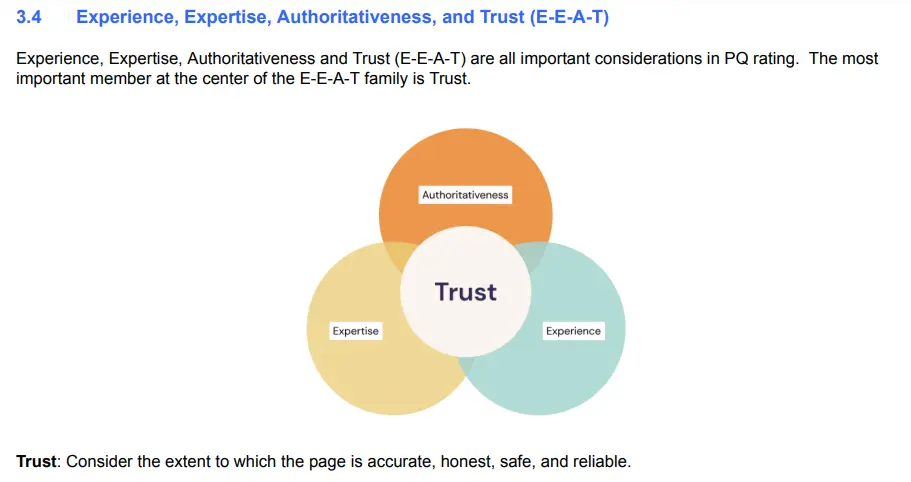In the ever-evolving landscape of search engine optimization (SEO), Google’s E-E-A-T framework has emerged as a cornerstone for website owners and content creators striving to enhance their online visibility. E-E-A-T stands for Experience, Expertise, Authority, and Trust, representing essential components that Google assesses to determine the quality and relevance of web pages. Embracing Google E-E-A-T not only improves your website’s ranking potential but also fosters credibility and reliability within your niche. In this guide, I’ll delve into each element of E-E-A-T and shed light on why Trust holds paramount importance among them.
Google E-E-A-T
Experience
Experience is the newest addition to Google’s quality ranking guidelines. Before this update in 2022, these guidelines were only based on E-A-T. The additional ‘E’ was added recently, and as explained by Google, Experience means that the writer or content creator has first-hand experience regarding the topic. This means either writing a blog post, a review or any other piece of content only after you’ve had a first-hand experience with the topic. For example, writing a review for a product you’ve used yourself.
To enhance the experience, the writer must have experience with the topic they are writing about. For example, when writing a review about a specific phone, Google will reward pages written by people who have used that phone themselves.
Expertise
Expertise pertains to the depth and breadth of knowledge demonstrated in your content. Google assesses the expertise of authors and content creators, particularly in areas requiring specialized knowledge such as medical, legal, or financial advice. Establishing credibility through authoritative and well-researched content solidifies your expertise in your respective field or industry.
Demonstrate expertise by providing accurate information supported by reputable sources, and showcasing credentials or relevant experience. Consistency in delivering high-quality content that educates, informs, and adds value to your audience strengthens your authority within your niche and reinforces your website’s credibility.
Authority
Authority revolves around the reputation and influence your website commands within its niche or industry. Backlinks from reputable sources, mentions from influencers, and positive reviews all contribute to building authority and credibility. Google considers the quantity and quality of inbound links as indicators of a website’s authority and relevance to a particular topic.
To bolster authority, cultivate relationships with other authoritative websites, engage in guest blogging, and actively participate in relevant online communities. Consistently producing valuable content that resonates with your target audience fosters a loyal following and encourages natural link acquisition, further solidifying your website’s authority and enhancing its visibility in search results.
Trust
Trust serves as the cornerstone of Google’s E-E-A-T framework, encompassing factors such as transparency, reliability, and integrity. While experience, expertise, and authority are essential, trust emerges as the most crucial element, as it directly influences user confidence in your website’s content and recommendations.
Google describes trust as one of the most important aspects in the E-E-A-T framework.

Building trust involves establishing transparency regarding your identity, purpose, and intentions. Display contact information, privacy policies, and terms of service to reassure users of your website’s credibility and legitimacy. Additionally, prioritize accuracy and reliability in your content, fact-checking information, and avoiding deceptive or misleading practices.
Earning trust takes time and consistent effort, but its impact on your website’s reputation and ranking potential cannot be overstated. Websites that prioritize trustworthiness foster long-term relationships with users, leading to higher levels of engagement, repeat visits, and positive word-of-mouth referrals.
Why is Google E-E-A-T Important?
Following Google E-E-A-T guidelines can help you improve your content and increase your chances of ranking better on Google. However, before we understand its importance, first let’s understand YMYL sites and why E-E-A-T is necessary for them.
YMYL Sites
YMYL stands for “Your Money or Your Life,” a term coined by Google to categorize websites and content that could significantly impact a user’s health, financial stability, safety, or overall happiness. This type of content can have a direct impact on users’ lives, well-being, or financial situations which is why these websites need to follow Google E-E-A-T guidelines. This ensures that YMYL websites uphold their responsibility to users by offering reliable, accurate content that prioritizes their safety and well-being. Websites that fall under this category are news, medical and health information websites, financial investment advice websites, legal information and advice sites, and safety and emergency preparedness sites.
Now, let’s understand why Google E-E-A-T is important.
- Quality Assurance: E-E-A-T serves as a quality assurance mechanism for search engines like Google. By assessing a website’s experience, expertise, authority, and trustworthiness, search engines can ensure that users are directed to high-quality, reliable content that meets their needs and expectations.
- User Satisfaction: Prioritizing E-E-A-T elements enhances the overall user experience. Websites that offer valuable, accurate, and trustworthy information are more likely to satisfy user queries and address their concerns effectively. Positive user experiences lead to increased engagement, lower bounce rates, and longer dwell times, which are all favorable signals for search engine rankings.
- Credibility and Reputation: Establishing Google E-E-A-T signals credibility and builds a reputable online presence. Websites that consistently demonstrate expertise, authority, and trustworthiness within their niche or industry gain the trust of both users and search engines. This credibility enhances a website’s reputation and increases its visibility in search results.
- Competitive Advantage: Adhering to E-E-A-T principles provides a competitive advantage in the crowded online landscape. Websites that prioritize user experience, showcase expertise, and foster trust are more likely to stand out from competitors and attract organic traffic. This can lead to higher conversion rates, increased brand loyalty, and sustained long-term success.
- Adaptation to Algorithm Updates: Search engine algorithms are constantly evolving to better serve user needs and combat spammy or low-quality content. By focusing on E-E-A-T, website owners can adapt to algorithm updates more effectively and mitigate the risk of penalties or ranking fluctuations. Just like the recent core and spam update released by Google has hit a lot of websites that have been producing low-quality content. Had they been following the Google E-E-A-T guidelines, they would’ve been in a better place with this new update. Investing in Google E-E-A-T optimization ensures long-term resilience and stability in search engine rankings.
Best SEO Practices to Implement Google E-E-A-T
As a website owner, implementing E-E-A-T is essential for enhancing your website’s credibility, visibility, and overall performance in search engine rankings. Here are some of the best ways to implement Google E-E-A-T effectively:
- Publish High-Quality Content: Produce well-researched, informative content that demonstrates your expertise in your niche or industry.
- Create Engaging UGC: Focus on creating user-generated content, and incorporate engaging visuals, videos, and interactive elements to enhance user engagement and retention.
- Regularly Update Content: Keep your website’s content fresh, relevant, and up-to-date to provide value to your audience and encourage return visits.
- Offer In-Depth Analysis: Provide insightful analysis, case studies, or original research to showcase your depth of knowledge and expertise.
- Highlight Author Credentials: Clearly showcase the qualifications, expertise, and experience of authors or contributors to establish credibility and authority.
- Build Backlinks from Authority Sites: Earn backlinks from reputable websites within your niche or industry to signal authority and improve search engine rankings.
- Guest Blogging and Collaborations: Contribute guest posts to authoritative websites or collaborate with influencers to expand your reach and establish authority.
- Participate in Industry Events: Engage in conferences, webinars, and forums relevant to your field to network with peers and enhance your industry presence.
- Share Testimonials and Reviews: Display positive testimonials, reviews, or endorsements from satisfied customers or clients to bolster trust and authority.
- Be Transparent and Authentic: Provide clear contact information, privacy policies, and terms of service to build trust with users and demonstrate transparency.
- Verify Information Accuracy: Fact-check information rigorously and ensure that all content is accurate, reliable, and free from errors or misinformation.
- Address User Concerns Promptly: Respond to user feedback, inquiries, or complaints promptly and transparently to build trust and credibility.
- Establish Social Proof: Showcase social proof, such as social media followers, subscriber counts, or industry awards, to reinforce trust and credibility.
In conclusion, Google E-E-A-T framework underscores the importance of prioritizing user experience, expertise, authority, and above all, trust, in optimizing your website’s ranking potential. By adhering to E-E-A-T principles and consistently delivering valuable, trustworthy content, you not only enhance your visibility in search results but also cultivate a loyal audience base that values and respects your contributions within your niche or industry.

